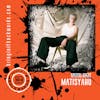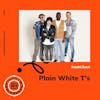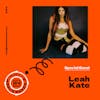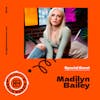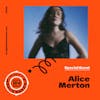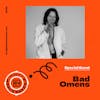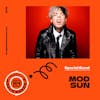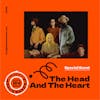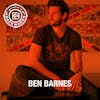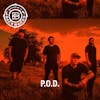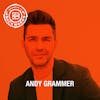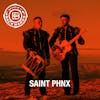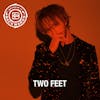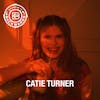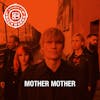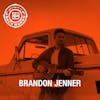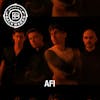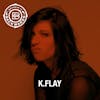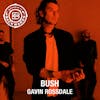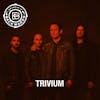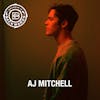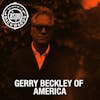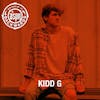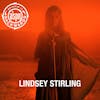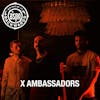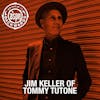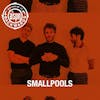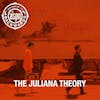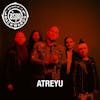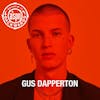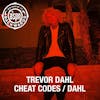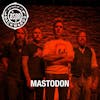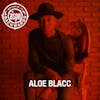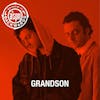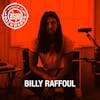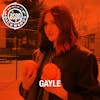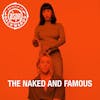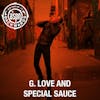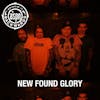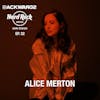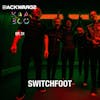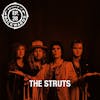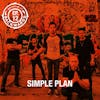Interview with St. Lucia
We had the pleasure of interviewing St. Lucia over Zoom video!
Led by husband-and-wife duo South Africa-born Jean-Philip Grobler and Germany-born Patti Beranek, St. Lucia retreat from a fractured world on fire and into the glow of a rapturous...
We had the pleasure of interviewing St. Lucia over Zoom video!
Led by husband-and-wife duo South Africa-born Jean-Philip Grobler and Germany-born Patti Beranek, St. Lucia retreat from a fractured world on fire and into the glow of a rapturous synth-spiked electro-pop catharsis—like a dance party at the edge of existence. Now signed to Nettwerk Records, the group beams out a light of their own and shines brighter than ever. “In a way, this is my personal rebellion against the darkness of the world,” states Jean-Philip. “It’s easy to feel depressed these days, so I’m trying to bring something joyous to the world. I was sick of seeing shit on the Internet, and I just wanted to feel good. That’s what being human is about. We have to feel alive, despite whatever the fuck is going on.”
St. Lucia has always stirred these kinds of emotions. It started with When The Night, which boasted fan favorites like “Elevate,” “All Eyes On You,” and “Closer Than This,” entered the Billboard Top 200 and hit #6 on Billboard’s Heatseekers Album chart. Its follow-up Matter, yielded the hit “Dancing On Glass,” while the band collaborated with artists ranging from Jack Antonoff to RAC. Two years later, Hyperion represented a creative and critical high watermark with praise from Billboard, who hailed the album as “buoyant,” and PopMatters who raved, “it feels revelatory.”
“When you listen to this, I hope you feel inspired and like life is worth living,” Jean leaves off. Patti adds, “it unleashes things, and I think we did a good job capturing that.”
We want to hear from you! Please email Tera@BringinitBackwards.com.
www.BringinitBackwards.com
#podcast #interview #bringinbackpod #StLucia #NewMusic #zoom
Listen & Subscribe to BiB
https://www.bringinitbackwards.com/follow/
Follow our podcast on Instagram and Twitter!
https://www.facebook.com/groups/bringinbackpod
We'd love to see you join our BiB Facebook Group.
Hello! It's Adam. Welcome back to bringing it backwards. A podcast where both legendary and rising artists tell their own personal stories of how they achieve stardom. On this episode, we had a chance to hang out with John and Patty of the band, Saint Lucia, over zoom video. John was born and raised in South Africa and Patty born and raised in Germany. We actually chat with them there at their house in Germany. They live in the same town that Patty grew up in now, and that's where they're raising their kids. Pretty cool. But John born and raised in South Africa went to high school to an all boys choir high school from there. He went to college at actually Paul McCartney's college in Liverpool, and that's where he met Patty who was going there for dance. 6 (2m 13s): Patty also got into music at an early age on the piano, big into Kung Fu. She was actually the world champion at 12 years old, and that helped her out immensely with her dancing. And that's how she got into the school. John has an amazing story about meeting Paul McCartney. We hear about their move from the UK to New York city for a job that John had starting their own studio, which eventually led to them starting St. Lucia. We hear about the release of that first EAP, which they just celebrated the 10 year anniversary of, we hear about them getting signed neon gold records, the success of that first album when the night, which eventually landed them on Columbia. 6 (2m 55s): We hear about where they were when COVID happened, a complete record that they really ready to go when quarantine started, but they move to Germany. This is when they moved to Germany and started working on even morning music. So we interviewed them from their house where they wrote and recorded utopia one, the, the new EAP, John even turns the camera. So you can see kind of the piano that they use for the record. And it's just, it's rad. So definitely check out the video version of the interview, which is up now on our YouTube channel. Check that out. It's up on our Facebook page as well. It'd be awesome if you subscribe to our channel like us on Facebook, follow us on Instagram, Twitter, and tic talk at bringing back pod. 6 (3m 37s): And if you're listening to this on Spotify, apple music, Google podcasts would be amazing if you follow us there as well. And if you have time, hook us up with a five star review, 7 (3m 47s): We'd appreciate your support. If you follow and subscribe to our podcasts, wherever you listen to podcasts, 6 (3m 53s): We're bringing it backwards with St. Lucia. I'm doing well. I'm doing well. How are you both doing? 8 (4m 0s): We're doing kid. Patty just got back from a com food. And that you just took one bite of a meatloaf sandwich that you made for us To take the kids to bed. And we have wine because here it is 9:00 PM. 9 (4m 17s): Dropbox and alcoholics. 6 (4m 21s): Well, if you want to eat your sandwich, it's fine with me. 8 (4m 24s): No, we're good. We're good. Okay. It doesn't need to be anything. She's a mom. She can do. 6 (4m 30s): I love that. Well, thank you both so much for being here. I'm so excited to talk with you. My name's Alan, And this is about you both and your journey in music and obviously the new, the new EAP and the new record label and all the fun stuff coming out with St. Lucia. So 9 (4m 46s): Cool. Sweet. 6 (4m 49s): Awesome. I love your background. By the way it looks, it's probably just totally a painting. 8 (4m 55s): It's actually a tapestry. It's, it's an Tommy from Mexico. It's like the autonomy people make it, You see it a lot in like on pillowcases and stuff, but picked us up actually in LA at the natural history museum a few years ago, there was like an exhibit of central and south American folk art. And this was their calling my name and it was like a good price. So 6 (5m 18s): That's awesome. That looks so good. 9 (5m 21s): Yeah, we love it. It's like a fav I think. 6 (5m 27s): So you said it's a south African piece. Mexican peace. Okay. Cause you're from, 8 (5m 35s): There's a lot. You see a lot of the stuff that you don't often see people like this and it's like a bit more detailed. 6 (5m 41s): Oh, sure, sure, sure. Okay. I'm from San Diego. I know Tiawana area. That's about it, but yeah, no, that's a very cool piece. So, well, I guess Jean born in, born in South Africa, correct? 8 (5m 56s): Correct. 6 (5m 57s): What was it like growing up there? It's so fascinating to me. 8 (6m 3s): I mean, to me it was normal. Just like anyone growing up anyway, you know, you're just like, this is where I live. You know, I'm sure people in the future who, you know, live in a place where they have flying cars and stuff will just be like, this is how I live. 9 (6m 19s): I mean, it was like pretty intense. Like you went to the most beautiful like school with like in the, in the mountains, like, whoa, 8 (6m 30s): I went to the side to this choir school called the drop is broke boys five. That was like, I always describe it as Hogwarts, but with music I guess. And yeah, but it was, you know, especially in retrospect, it was obviously very interesting growing up there because there's such a like interesting and dark and just all sorts of whatever, whatever you want to call it, cultural rub with things, you know? And it's yeah. I mean, I feel very fortunate to have grown up there because I think, yeah, I feel so lucky to have been exposed to so many cultures. And just to, I dunno, I dunno how to talk about it. That's amazing. 8 (7m 11s): And I 9 (7m 11s): Must say it's 8 (7m 12s): A beautiful country. And like, whenever, you know, we were just there for five weeks at the start of the year with the kids and it's just such a joy and a vibrancy to the place that 9 (7m 26s): You can only feel when you're there. You know, it's like, yeah, 6 (7m 29s): Well you said you went to a, a choir school, a school that's amazing. And so I'm imagining you have to audition to get into the school and how do, how do you get there? And like, how do you get into music originally? 8 (7m 43s): Well, you, yeah, you have to audition. It's a very small school is like a hundred kids about, and I sang from a distance And I was just, I dunno, I was, my parents always say that it wasn't cause I had the best voice at school, but because I had the loudest, they always gave me Zola solos. And, and then I just went into audition, long story. And then, you know, something caught me there because I was having a hard time at school. And I was always like running away and climbing up trees and running away from teachers and stuff. And there was something about that place that was challenging. 8 (8m 27s): And it was just this deep musical education. I mean, we were doing like two hours of quiet practice every day. We'd go on an international tour every year for like a mile, you know? So I was, went to Japan, went to, came, went to the states twice Europe, Australia, you know, it was just like this amazing experience to have as a kid and also totally surrounded by nature, like in the mountains and 9 (8m 52s): Yeah. Yeah. 8 (8m 53s): You know, like kind of the stories you hear bike when, when, you know, from your grandparents or something, you know, it was like, we would, you know, too in the afternoons, we'd go and build a Fort by the river and just swim in the river or go on a hike. And like there'd be baboons, you know, and monkeys and a kid would catch a snake and bring the United, just like all this kind of stuff. Which to me was totally normal. I mean, it was, you know, and at the time I was just like, ah, like, especially when I was getting more into my teens, cause I went there when I was 10 and left when I was 15. And you know, when I was like 13, 14, I was like, oh, this place sucks. I just want girls. Cause it was a little boy And occasionally we'd have choirs visiting from somewhere. And occasionally it was like a mixed choir and it was like some shenanigans would go down 6 (9m 40s): That he's like, huh 8 (9m 44s): I've ever had. 10 (9m 45s): Don't worry. 6 (9m 48s): Do you come from a musical household, 8 (9m 53s): One generation behind BS above my parents. So my grandparents, my mom, my mom's dad is apparently an amazing pianist. And he had like a deformed hand from like swimming in a radioactive dam at some point, like a, Just do the base with this kind of deformed hand. I never met him. And my, I dunno, there was this, there was music and entertainment in my parents' parents' generation. My mom was a, she made a documentary spring up, but she was documentary makeup. That's 6 (10m 34s): Still arts and your family, obviously arts 8 (10m 36s): And you know, and I always would go along with her on, on shirts. And when I got a bit older, I would do the sound for her already really bad. And they introduced the loud. And I remember like having those, this one program, she did once about bats, like bat houses. And I remember climbing into this huge like bat house with like a rifle mic just with bats ever. And it just smelled like bat poop, Guana. 6 (10m 59s): That's like, terrifying me right now. Like, oh my gosh, I cannot handle that at 10 (11m 4s): All. 8 (11m 6s): Yes. The radioactive this for my grandfather's hand. Yeah. So it kind of, but definitely, you know, autistic and, and like my parents were definitely very encouraging, encouraging, but what I do, you know, like they always open-minded and like my mom would sometimes try and dissuade me because, you know, she was in the biz and she knew the, you know, the dark side of it all. And actually my godfather was this guy, both fora who directed the series, Shaka, Zulu, which was Famous. 8 (11m 47s): Like he directed, my mom actually produced it when she was looking at me and she was dealing with older musicians and stuff and she thinks maybe that's why I was musical because she was dealing with all the music and yeah. And he was so he was like a famous film director from South Africa. And so there's definitely been auths around. 6 (12m 4s): That's amazing. That's cool that your, your family was that, I mean, supportive of it just even to send you to a choir high school, I mean that's big in itself, right? I mean, 8 (12m 14s): Yeah. I mean, 6 (12m 15s): People have usually it's like, no, you're going to go learn this instead, but wow. What about you about a year from Germany? Is that what I wrote? Yeah. 9 (12m 23s): Yeah. I'm from where we currently at and I basically grew up in this place. Yup. That's it. Wow. 6 (12m 33s): That's it. Tell me about 8 (12m 37s): The south of Germany on the border with Switzerland. 9 (12m 39s): No. Yeah. Very idyllic, super idyllic. I guess we had idealic in our lives. We've fortunate to do, to have that because mountains, legs, all that stuff is here, you know? So yeah. It's really nice Being a kid here. You know, 6 (12m 56s): It sounds like there's a lot of, 9 (12m 57s): You have like a sense of like independence from a really young age. Cause it's pretty safe here. And you know, we walk to school by ourselves and you know, I pick up my friend and I feel like indie will do that soon. And you know, I mean, he, he goes through like by himself already and his fault, so, 6 (13m 16s): Oh, wow. That's cool. 8 (13m 19s): You know, we don't just for the record, we don't just let him go by himself 9 (13m 23s): Because times have changed. But, but 8 (13m 25s): He'll go ahead. Like, so there's this amazing. It's how they, Angela Ceria in town called Dola meaty. That's been here since Patty was a kid and he just knows the way. So he'll just go on his bicycle 9 (13m 37s): And 8 (13m 38s): You'll already be ordering when he gets there. 6 (13m 42s): That's cool. Is it cool being back in your hometown? Like raising your kids there? 9 (13m 48s): Yeah. I mean I'm like to yes and no. You know, I love it here and it's ideal for kids. I miss our friends in America and I miss, I miss the states in general. I think there's a, there's a certain vibe and energy there and people they're very, you know, people always like say or a principal sometimes. Like, you know, so, you know, I love America. I love the fact that like everybody's friendly and like actually generous and kind of open-minded. And I always feel that like, when you have an idea that, and like you talk to somebody about it, somehow it, it happens, you know, you get into to a place where it's like, oh yeah, I know some, but I know somebody who can help you with that. 9 (14m 36s): And then you meet somebody else. And like, I dunno, the Very traditional here, you know? So, you know, I miss that, but I, yeah, I think for, for the kids, this is really cool, like really cool. And we have family around, so it's really helpful. 6 (14m 58s): Yeah. I was going to say that's always a huge help. My family, I have two kids and we moved to Nashville like a year, a little over a year ago. A year in February, or it was a year in February 9 (15m 8s): Now in Nashville. 6 (15m 10s): Yeah, just south of Nashville. And the suburbs 8 (15m 12s): From Nashville. 6 (15m 13s): No, from San Diego. Yeah. So we moved here, my wife and I are all from San Diego originally and we moved here and just, I mean our, both of our parents and siblings, everyone lives in San Diego still. So it's like, we got here and I'm like no help to have the help and support is so big. And we didn't realize how big, I mean, we knew it was big when you come here and you don't have it. And it's like, whoa, okay. 8 (15m 38s): Yeah, it's crazy. I mean, it's like, we ha I mean, we basically the whole of 2020 experience spot with how old was India at the time, too, just being locked down in an apartment, you know, with a kid. And you're just like 9 (15m 52s): Pregnant with, 6 (15m 54s): From what I read your, your second child was born in 20, 20 9 (15m 59s): Friday, 6 (16m 3s): November, 8 (16m 4s): Whenever you're very lucky kid. Probably whatever. 9 (16m 8s): No, it was. Yeah. So it was definitely like, you definitely realize, and maybe that prompted the move actually, because it was like, I sat there and I was like, wow, my life has changed completely. Where am I? And then now what do we do? You know? So, 8 (16m 24s): Yeah. But it's great. We'd like, we now have our studio in our apartment and it's in the building that Patty's parents live in. Oh yeah. And it's just, it's, you know, sometimes it can be a bit much, but most of the time it's a great floor because, you know, if we're inspired, everything's just here. I mean, this room that we're in our living room, I'll just show you around real quick 6 (16m 46s): Love. 8 (16m 46s): This is so there's the piano and this is the piano. That's all over the record. You know, the studio is just behind this wall. And so we just do everything here, you know, and just like all percussion, just everything is done in the space and the kids hear it happening and it's the family's part of it. And for all of its imperfections, it just has a certain vibe. And, and it's not like, okay, we're going to the studio now. 9 (17m 12s): I think for me, especially, you know, in New York we had the studio elsewhere and it was really, I always had to organize, you know, babysitters or this and that. And well, you know, we'd take into with us and then I couldn't do that much, you know? And it was just, I think even if I don't, if I don't actively go into the studios that much, the doors open, I, and I hear what's going on and it's huge, you know, I just know what's coming out. And then like today he started like a song and I heard the ma like I heard the, the, the beginnings of it. And I was like, oh, I hear this. You know, and then, you know, 8 (17m 56s): It's going to be a combination. Yeah. 9 (17m 58s): But it's been nice for me in that way, you know? And like you kind of way. 6 (18m 2s): Yeah. It was that kind of how this recent EAP was built. Just that way. 8 (18m 8s): Yeah. Basically. I mean, the drums are recorded in, in Brooklyn with Dustin just cause, you know, I had to go back and forth for a few DJ sets and a few things, but everything else was just recorded here, you know, like, and this is great. I mean, what's so nice about these old European houses. They have like pretty good acoustics in general because things are slightly uneven and not exactly perfect and a lot of wood around. So like things in the bathroom and the kitchen with the hallway. And it's just like a reverb from every, you know, and it's fairly quiet, you know, sometimes you hear a car passing by or a siren or whatever, but it just, it adds to this kind of vibe a little bit. 6 (18m 48s): Yeah. I like the, that grit kind of sounded in records. It's not like fully, you know, ridiculously polished, like some of the little things like that are really cool to kind of find like here, you're like, oh, a little Easter egg, there's a ambulance driving by at this time signature or whatever it is. 8 (19m 5s): It's interesting that way, because like, you know, I didn't go to school for, for like audio engineering or anything. I went to I've studied, studied like songwriting and stuff, but I've learned so much about Mike technique because of that, like eliminating the noise, you know, if you're Just like, okay, well I need to use this mic that only picks up from here. And like I've been using on like a dynamic Michael, my voice, which is Like basically what you're using, like using an SM seven, right? 6 (19m 33s): Yeah, yeah. 8 (19m 34s): Yeah. So similar mic that is just, you know, basically it doesn't think 6 (19m 37s): It doesn't pick up the room. Right, right. I had a condenser mic and it was a nightmare to deal with because I had to get like the gate and everything all perfect. Or you could hear like any sound from like across the room. It was, yeah. 8 (19m 51s): I always feel like those Mike's reproduce the human voice actually the most naturally it's not like zinc, But it's got this nice sort of honky, mid range. 6 (20m 9s): Patty, how did you get into music? 9 (20m 13s): Pretty late. Actually, I was, well, I always was doing music, but like, I didn't actually think of it as like a professional thing. It was always very sensitive and very sensitive itself, but like, it was always, it was more of a, I would say a healing tool in a way. Like I would always play the piano and like, if I was sad or crying, I would go and play it. You know, like in these moments it was always, 8 (20m 40s): And I do a really good pianist grip, some classical things. 6 (20m 45s): Was that your first century? 9 (20m 52s): Well, it was, it's always been, it's always been there, you know, and I it's always, like, I would say it's always been a healing tool more than anything for me, or like a ex like some form of expression, but I'm very shy when it comes to my stuff actually. And very, you know, 8 (21m 10s): The hardest thing with Patty is she will just sit at the piano and just play the most beautiful thing. And I will literally be crying from this is so beautiful. And there'll be like bags. I have to recall this. 9 (21m 23s): Yeah, of course. But this is what I mean, 8 (21m 26s): Somehow it inspires something down the road, but it's just like, I need to just have Mike's on the piano at all times. 6 (21m 33s): Just going to say that. 9 (21m 34s): Yeah. But it doesn't work like that. You know, the moment I know that there's something there, it kind of changes it's like that single. 6 (21m 44s): Oh, right, right. Well, you can stick something under, I don't know, figure out a way to do it where you can like hit it from your phone or something. And then, 8 (21m 52s): But it would still collapse the wave state of the quantum field. 6 (21m 57s): She would know somehow 9 (21m 59s): And my way to go. No, no. Yeah. So it was, but yeah, I always love to always say I love singing. I love like just twinkling and whatever. And then I mentioned, and it was interesting cause he is like, you knew exactly what he wanted, you know? And like musically he is so like, and always has been clear. Like he's very clear, like this is what I want. This is what I hear. This is like what I do. And like, it's not always the same stuff, obviously. Like we've gone through many years of like different music, you know, but I dunno, we just, we connected and we also can, we connected musically as well. 9 (22m 43s): And it, and at one point we were just like, oh, maybe we should start doing some stuff together. Cause we weren't actually doing it anyway. You know, to, to get over. 8 (22m 52s): We were also working, we moved to New York to work at a jingle house, like a music house. And Patty started seeing on a lot of the stuff that I was doing. Like if I needed female vocals and I think it was just that that made me go like, oh damn like you sound really good on these tracks. And I think it's still a couple out there with Patty. This is like a capital one ad. There was From back in the day, this was like 2006, 2007. And, and yeah. 9 (23m 22s): And actually try to avoid working with one another because everybody always said like, oh, you together and it's bad for the relationship. It's all that stuff. So I, and I always, you know, you think like, oh yeah, we keep things. And then, but not, I think naturally we just, we just felt like it just, it just was natural. You know, we sort of had it that way. And then at one point John kind of said, oh, maybe we should just, maybe we should just join my bank. You know, when I was like, careful, you know, we might get signed. And then we got, 6 (24m 6s): Well, obviously, so did you meet and you and UK when you're going into school, John, 8 (24m 12s): Okay. This is today. Well, this year is our 20th year together. 6 (24m 19s): Wow. That is so amazing. Congratulations. 8 (24m 24s): So I was going to 6 (24m 25s): Say, I think we're about the same age, so I'm just, I'm there with you 10 (24m 29s): When I say, 6 (24m 31s): Well, 25. 8 (24m 36s): Yeah. We, so, you know, I moved, I went to England to go to this, the school, we both went to the school Lippa which Liverpool and Cedar performing arts, which is the school Coleman cottony started. 6 (24m 46s): Wow. 8 (24m 46s): Well, and it's a smoothie, the school he went through growing up and, And we both met him a couple of times. Like I had a really riding lesson with her, which is crazy. Here's a funny, I'm going to tell you this, this funny story, this is embarrassing, but I just think it's great. Great, funny, embarrassing story. So we got a private, some riding lesson with global coffee at the end of our time there. And we had to pick one song that we'd written to play for him and I'd written the song. And at the time I wasn't like, you know, I obviously listened to the Beatles growing up, but like I wasn't, at that time a huge fan. 8 (25m 29s): I wasn't super familiar with the song titles and I'd written a song called carry the weight and I have no idea, you know? And so, so my tutor was like, yeah, you got to play this song for him. Obviously knowing that, like I had no idea. And so I played the whole, the song and he was like, this is beautiful. And it was kind of like a very kind of imaginary song, you know? Like I want, you know, I want to start a new religion, like a very kind of like bright eyes, green eyes songs. And, And he loved it. And he like made a suggestion and I, I kept it. And now I have a car ride with Paul McCartney. 8 (26m 9s): That'll probably never see the light of day, but 6 (26m 11s): Well, you should release that. That's an that's so cool. 8 (26m 18s): But yeah, so that was sort of embarrassed. My, 6 (26m 21s): I literally want to just go to school there just so I can meet Paul McCartney. And that's like my, honestly like my dream in life, like that is, I'm not, I'm not a songwriter. I pretend I was just to get to meet him. So, whoa. So Patty, what'd you go to school there for piano 9 (26m 39s): And no, I went to do like, it was a performing arts. Cool. So I did like, I actually went there to dance more than music, but it was like, well, me also, those dancing, you know, It was a combination. My calls, No. So my journey is really weird. I did a lot of come through when I was a kid and 8 (27m 8s): Well champion when she was 12, she will never tell you that, but 6 (27m 11s): Oh wow. Now it all makes sense with the Kung Fu coming in at 9:00 PM. 9 (27m 17s): I'm not for like 25 years or something, you know, I left really early. Like I, I only did it when I was like a kid kid, you know, maybe when I was 12 and then 6 (27m 25s): So at 12 you're just like, he beat everybody and you're like, all right, I'm done. 9 (27m 29s): No, it was the kids. It wasn't the adults. 6 (27m 32s): It was, Yeah. WorldShare 8 (27m 41s): Form as well. So it's like chopping kids. 6 (27m 43s): Oh my gosh. That is, 9 (27m 47s): It's basically like, it's more like, you know, at the time it, especially the style that I did move, she was very, it was very like, it was in a way quite dancy, you know, you'd get a form and you show it and like, stuff like that. So I, I came from there and then I didn't really dance. Like I took some ballet when I was a kid or something, you know, a little bit, but it never really, I wasn't me and ballet anyway. Well then I, but I loved, I, I went to school in England as well. And there was a, an amazing teacher that was a dance teacher and it was just less sort of like hoppy dance kind of course, you know? 9 (28m 28s): And I was amazed that they were offering that at school. So I did it and she was like, oh my God, you're so good. You should, you should do that. And she had such an energy that I decided like, oh, I want to, I want to study it. I want to do like the eight levels and dance. And then they didn't do the coolest because I was like the only one that wanted to do it. So I didn't really dance like ever, but I just loved, like, and then I took like a Monday class or something and then I decided, no, I love it. I love dancing so much. And then I heard about, I read about this, you know, school. And I was like, I'm going to go there. I'm going to go there. And then eat could be booby. Obviously I went and auditioned and I was like, I'm not going anywhere else. I'm doing this. And then, and then I kind of like, cause you have to show a dance or something. 9 (29m 12s): And then I just basically did come through and they thought it was really interesting. And what was really good about this school is that it wasn't like a normal kind of like, oh, we're, you know, we're, we're concentrating on just like this and this and that. It was like, they love the variety. They love like, you know, so they would have 8 (29m 29s): Different ideas 9 (29m 30s): And ideas, like, you know, would, there was like 15 of us or something only. And, and then 8 (29m 38s): In the 6 (29m 39s): Dumps, you come on doing like Kung Fu dance. And other people probably had other specialties, right? Like ballet or hip hop, whatever it is, 9 (29m 48s): Ballet tap or jazz. And then come through. 8 (29m 52s): I mean, in our clause too, it was like so many end. Like, you know, the man, the wombats, 6 (29m 56s): Oh yeah. 8 (29m 57s): A year below me 6 (29m 59s): Where they really, 8 (29m 60s): And we would play like the same shows all the time. And like I had a small side project with, toward the basis for awhile. And Yeah, it was a really awesome school. I mean, we had all sorts of different people, like, like in our class that would just, it was so diverse was so different. Yeah. 9 (30m 16s): And which was Rudy actually pool, you know, like really amazing actually in hindsight. 6 (30m 22s): So you both see me at school. Did you have a chance to be Paul McCartney too? Fatty? I'm just curious now. 9 (30m 27s): And then he would come into the dance class and he'd bow to us and then he broke and wait, wait, wait. And then he goes, you know, 6 (30m 35s): So he's actively there. Is he like the Dean? 8 (30m 39s): I don't know about now 9 (30m 40s): At the time, I think he had a lot of family there still and he would frequently go and visit and then he'd always come like once a year, at least, you know, like or twice a year or 8 (30m 50s): Something. 9 (30m 52s): And then at graduation, yeah. 6 (30m 56s): I need to like meet someone that's going there and just, just to attend the graduation. Right. I mean, there's some good shot to see 8 (31m 4s): Short diploma. 6 (31m 5s): Right. There you go. Try to find somebody pay to do like online classes through show up for this ceremony. Oh, wow. Okay. So you met, 9 (31m 19s): We haven't talked about that at all. You know, we, we have we ever talked about that? 6 (31m 24s): Oh, I'm glad that you're willing to chat. This is such a cool conversation. I mean, Well, that's good exclusivity here. So you guys met there obviously at the school and you start dating and when do you start playing music together? You said you moved in New York for like a jingle. You were working for a jingle company 1 (31m 45s): With a new Chevy Silverado. You might be driving in this, but with the Silverados, redesigned interior and large infotainment screens, it'll feel more like this. Introducing the new 20, 22 Chevy Silverado find new upgrades, find new roads Chevrolet. 8 (32m 1s): Yeah. So through, through a family connection, kind of, not really like, should we tell the whole thing, like basically Lucy's, Lucy's Al Patty's oldest sister, Lucy and I was traveling and was living in New York at the time and started dating this guy who was a partner at this music house. And obviously as a favor to her gave me a shot at doing some, some remote work. 9 (32m 29s): And then John killed it one night because it was like they were in a pinch and they needed something done. And because we knew like 8 (32m 36s): Seven minutes 9 (32m 39s): And we will pay time and like he just delivered and this, and then the head of the music company was like, all right, get him here. You know, that, that was yeah. 6 (32m 49s): Seven minute pee. Like that seems a little bit more than a jingle. 8 (32m 55s): It was crazy. It was crazy. And it was for some like Toyota, like internal video, that didn't really matter, you know, but like, they obviously gave it to me if like new guy, but then so then we moved over. They helped us move over. And then that was in 2006, September, 2006. 6 (33m 14s): Was that a tough decision to make or no? Was it like, oh, let's take this. And even for you, Patty, you were down to just move to New York. 9 (33m 20s): Well, I still was kind of working in on some stuff in Liverpool, but we, it wasn't, I had just bought my first car. Like I used little like open Plaza what'd you call it? And then this came through and I was like, wow, this was probably the worst decision to buy this car right now. He's not allowed to sell it again. So that was it. But yeah, it was really easy to say. Yeah. 8 (33m 51s): I mean, it was funny because for me, like New York really never featured in my imagination of where I wanted to be in my life for some reason, but it was just, it was like an obvious, like, okay, like you have to take this opportunity, you know? Cause it was just such a level up for us, like just having this up and it wasn't like the, the, the salary was really high or anything. Like we were fortunate over the next couple of years to make some good royalties on stuff, which let us then leave the job and like start our star studio and like stop St Lucia and that kind of stuff. And we learned so much doing it, you know, like having to write in a different genre every day, you know, all sorts of genres that I would never normally write in and learning about scents and stuff. 8 (34m 37s): Cause before I went there, I was like, I hated since I was just like, this is the worst thing ever in the whole world. And then being there, you know, there were just a few analog sensor around and no one at the time was sort of into analog sense. You know, it was, it was that time. And I was, I just took, took the opportunity to kind of learn about them. And I was like, you know, if I'm gonna do this, I'm gonna try and kind of excuse the fact that I'm a jingle writer by trying to make the music as real as possible. You know? And so I would just try and use the real instruments, learn about recording and stuff. Cause I had no idea. 6 (35m 10s): Wow. So you were, yeah. You could use that kind of as your own tool to even expand your own musical knowledge and get paid and kind of altogether in one day 8 (35m 22s): I feel like I almost learned more being there than at universal cause you actually under real pressure and you're this like real money involved, you know? And it's just like when that happens. Yeah. You just, I think you'd learn. So you just pull it together. 6 (35m 40s): So you started this, you started you guys studio while you're still working there and then was St Lucia a band yet or how did that start? 8 (35m 49s): So, so at the time, you know, I had a couple of bands in Liverpool and they kind of, they ended obviously removed and we've stopped going to the school and then we moved to New York and then I had a project called kites and Patty would sing sort of backing vocals on the stuff, but she wasn't officiating kind of part of the band and we played live and I met some musicians and we started playing together and it was just something I would kind of do on my downtime at work when no one was looking. Yeah. And I would always try and kind of like do it as well as I could, you know, like try and learn as much as possible. I get it mixed fog and good mix engineer. And then when we left it, when we left that job, we just made a new IEP and so abandoned school and, or it was my project, wasn't like a real band. 8 (36m 40s): It was like I had a live band and we had money either to start a studio or to promote this new VP that we made. And so we just like, well, 6 (36m 50s): Sorry. <inaudible> 8 (36m 56s): And yeah. And then we were just sort of like, you know, living off some of the royalties that was still coming in and savings and stuff for a while. And for a while it was kind of scary. I was working at a wine bar and then scratch the, you know, like I worked on a couple of production projects, still did some freelance stuff. Patty was working, we work on on stuff and then gradually kind of saying, you should start it to develop. And it was kind of informed by like what we were doing before St. Lucia was very kind of like, you know, indie slash alternative rock. And I guess, you know, it was this, this emergence of like vampire weekend Yasser, like those bands were kind of being kind of worldly, you know, like bringing world influences with the kind of rock and roll thing that made me actually go back and re-look at kind of African music and relisten to some of the guilty pleasure stuff that I loved growing up that I'd become sort of embarrassed about liking through over the years, you know, and just kind of started to reabsorb that and started making this music that was kind of naturally joyful and wasn't really holding anything back. 8 (38m 6s): And that's kind of where St. Lucia was kind of that just embracing the sort of where I came from and just the joyful joyfulness and the kind of nostalgic theme. 6 (38m 20s): That's correct. It's curious or not curious, but it's interesting. Cause I remember when that kind of shift happened and I come from alternative radio. So I remember like when that kind of happened when it was more of the Synthi, like electronic music was making its way into the alternative space, like you said, yay. Sarah was a big one, like MGMT, like when those bands are coming through, it was like, it totally changed. Yeah. Changed that whole, the whole, like, I mean like what people thought the alternative scene was it wasn't just like grunge bands and bands that sounded like brunch band and became like, yeah, just a whole different vibe. And then obviously foster the people in other bands eventually came out of that, that same world, but it's yeah, it's cool to be like kind of seeing that. 6 (39m 5s): And then you guys are, you can go back and pull some of these influences that you thought maybe, oh, like, I dunno if anyone would care about this, but then obviously it just creates this whole new sound, a new drama and it's, it's amazing. 8 (39m 19s): Yeah. It's sort of, you know, it's funny cause a lot of people talk about how a lot of artists talk about how music is therapy in a way, you know, And it, to me, it was just kind of like, it's almost just like therapeutic process of kind of, you know, living away from home for so long and just kind of like coming to terms with certain things and where you come from. And I think growing up in South Africa, it was never like a thing, you know? And I mean, obviously this has a lot to do with just being white and white privilege and all these things, but like growing up there and I feel like all the white kids that I knew that had bands, none of them wanted to sound like African. 8 (39m 60s): Like we all want it to sound like Radiohead or American bands or whatever, you know? So w all the bands that we play that we play with do shows with when I was a kid or want it to sound like those bands and started really took that to me to discover it and kind of like, appreciate really how amazing and magical my, my, my childhood was, you know? Yeah. 6 (40m 24s): Yeah. That's so cool. That's so cool. And when would you say, like, so Saint Lucia forums, you start working on just music and then are you playing out at all at this point? Or was it kind of utilizing that studio that you put the money into? 9 (40m 38s): It was, I think it was the studio. It was very cool because there was a, there was a time in Williamsburg, especially with when the studio was where there was like an energy and people just getting together and you would just meet somehow, you know, you would be at the studio. And there was, you know, Andy was down the, down the hole and then later on on the dock, kids were there. And like, there was like, 8 (41m 4s): <inaudible> right next door to the DAP Kings. So you can see like there, the whole time I saved him from being locked in a toilet forever. And then he wrote back that I haven't. So 10 (41m 19s): Hi 12 (41m 24s): Man. 8 (41m 24s): Yeah. Like Andy Baldwin are really, really good friend who mixed, mixed a lot of the night and helps us record drums and stuff, the 9 (41m 33s): Hallway as well. 8 (41m 35s): Yeah. There was just a five and it was just like one of these like plastic, Brooklyn loft buildings, you know, that are existing, less and less was just, you know, it was the biggest anarchist book publisher in the world. There was a circus, there was a bearded lady. 9 (41m 52s): There 8 (41m 52s): Was just, it was amazing. It was just this amazing place. You always felt like the freight elevator was going to drop. Like any moment when you loaded your gear into it, 6 (42m 0s): It sounds like it would be such a cool TV show about this building. 8 (42m 8s): Actually, the music video for elevate is about us leaving that space. And it's 6 (42m 13s): All, really, 9 (42m 16s): Everyone got evicted. 8 (42m 17s): Everyone got kicked out cause like they were turning it into condos. Yeah. So we, I mean, we didn't get served an eviction notice second the video, but you know, it's a dramatic whatever, but yeah, it was a really, really incredible magical time, you know, when, when it was, 9 (42m 35s): And isn't this why we also then met Nick brown. 8 (42m 39s): Yeah. So we then met 9 (42m 40s): Eric Brown, kind of the reason why things sort of started like, 8 (42m 46s): Yeah. So Nick brown, who was our original drummer, he played drums on another project. I was producing for friend and we stayed in touch. And then eventually I started sending him some of the music that I was working on and he really likes it. And so we just started working on stuff. He played up the drums on a few things. And when things were at a certain point, he just played them for his cousin who is DJ Yurok from the Knox. 6 (43m 10s): Really I've interviewed him before that. Great, great guys. 8 (43m 14s): Yeah. Be rock is awesome. And Yurok then was interested and we got involved with that label. We signed to them for like the, I don't know if we signed to the EPO, just the single, but we 6 (43m 26s): Were neon gold. 8 (43m 28s): Well, first there was just, it was heavy rock, which is the NOx label Released all eyes on you. And the old house has gone with them <inaudible> And the first album with them. And then I think they parted ways of Columbia and then the rest was with Columbia and then now we're. 6 (43m 49s): Yeah. Okay. Well, so, so, okay. Sorry. Let's rewind. Okay. So back to No, no, no. So you were just, you just happened, you worked with, sorry, you, the one guy that introduced you then to the Knox and that's kind of what, what got the ball rolling here? I guess I got lost. Yeah. 8 (44m 9s): Okay. So Nick brown, who ended up being our original drummer up until when the night, our first record was released, He introduced us to Ben's Minox 6 (44m 20s): Yeah. Okay. Now I got it. 9 (44m 22s): Yeah. One thing led to another kind of thing. And then yeah. 8 (44m 25s): Yeah. Just being around there at that time and things happening and you pick up on the energy and yeah, it was, it was, it was a crazy 9 (44m 34s): Time 8 (44m 37s): And it was like 10 years ago now. Crazy. Like we just, we just celebrated the 10 year anniversary of our first of the first EPA. And we did like a whole little retrospective thing and it was quite emotional. 6 (44m 52s): No, that's so cool. That is that's. Yeah. Think 10 years later, you'd still be doing this. And you know, the amount of success that you've had is that must be crazy to think. 8 (45m 1s): Yeah. We had a good training for having kids though, by having a bag, I'll tell you that, 9 (45m 8s): Oh man. I'm like beat. I'm like, what is this? 8 (45m 11s): Definitely harder having kids, but it's also, 6 (45m 15s): Yeah. Well, what, what was like, I mean, obviously we went over a lot there, but like, what'd you say, like the next kind of big moment, was it getting the deal with neon gold records? It was like kind of the next success within the career, 9 (45m 28s): For sure. I think just, yeah, for sure. It's sort of like being like, people would just picking up on it and that it was just like people were loving the sound, you know? And then I just remember things started moving quite fast from there actually. 8 (45m 46s): Well, what was, what was, what's funny, like looking back as looking back now, it seems like it happens so fast. Like actually, if you look at that period of like three or four years, it was like, we were playing two nights at terminal five, you know, but at the time it was like, you know, we, we, and these were all pivotal things that lined up to us then, you know, playing two nights as terminal five at the end of the, when the night or, you know, it was, it was signing to you on gold and you sort of get noticed, cause you're on like major labels. You play south by Southwest. There was one Southwest, Southwest, Southwest shore. I lost my voice and I ran off stage in front of all of Sony. And it was just like, oh my God, we're gonna die off to this. 8 (46m 28s): But then it keeps going. And then, you know, we supported Ellie Golding on tour. We supported Touro cinema club. We had all these great support slots that were great. We had a few great sinks. Like there was this huge sink for taco bell that I was like, oh God, are we really doing a taco bell sank? But then, But then it was maybe one of the hugest things for us. So it's still the biggest sync that we, that we've had, I think to this day and just all of these things. And then, yeah, that's kind of what contributed to that crazy girl. Wow. 6 (47m 0s): So where were you all when, when COVID happened and obviously you were able to write this, this CP and did that start before the lockdown happened or were you guys still in New York when that happened? 9 (47m 11s): Yeah, we were still in New York, but we actually been working on a lot of stuff already. We actually have a whole other album. 6 (47m 22s): He really is. It is it, is it really? Is it utopia one? Is that, is that what it is? So those are utopia too, then I would write. Okay. So I saw Your utopia And I'm like, is that just like a, like a Ford slash I didn't, I couldn't tell. So I wanted to add 8 (47m 43s): That's the one. So we just, you know, I mean, we've always just released albums and with this whole pandemic, I mean, before the pandemic already, we had a lot of unreleased music that we were working on and trying to finish off. And then the pandemic hit and we started working on a whole, other bunch of music that we already started was is basically already all mixed by Peter cadence. And that's a whole other album, like that's basically utopia three and four. 6 (48m 9s): Oh, wow. So that was written pre B a one two. And it was Just using your, your 8 (48m 21s): All right. Our second option with network hasn't even been picked up yet. So we don't even know if we're going to get 6 (48m 26s): You're already, you're already four albums in with them. <inaudible> 8 (48m 30s): I think it's like, I feel like I've seen so many artists doing the same thing because like what could anyone do during this time, but somehow With what was going on? 9 (48m 39s): Yeah. I think you have to imagine, like, as an artist, also, this oldest, like your whole life has been upset, turned upside down. And if you're honing on it in some way or form or another, or if you're just picking up on like, what is going on in the air, you know, and these two last two years have been crazy, you know, actually crazy for everybody. So I think at one point you just start picking up on whatever vibe you're feeling, and then out came another whole album, you know, 8 (49m 10s): Well, we made this whole wreck and then when we, the story is kind of like this. So we made this first thing, which we were like, this is done whatever, but we didn't have a label to release it through yet. So we started the kind of process of that. And while that was happening, we then moved to Germany in February of last year. And I think there was just the sense of kind of relief and release. And, you know, we sort of were feeling like, oh, maybe we need a couple more kind of single ish songs or something on, on this album that we made. And we just started writing again. We just were like writing and it had a different energy. And then we just basically made a whole other album last year. 8 (49m 54s): Yeah. So we have, we have a ton of music. I mean, you know, I, I say that we have probably three or four, I don't quite know exactly how it's going to come out yet. 6 (50m 0s): Right, right. I was just using sample 8 (50m 4s): There. 6 (50m 8s): That's so cool. So then you get to Germany and you're in this spot that you're at now and what you just start working and working and working and outcomes, all these new songs and utopia. One is what you are doing, working on in that very area. You're at 8 (50m 24s): One answer is all here basically apart from wow. And yeah, I mean, it was just, I think it's really like, it's funny cause Damon <inaudible> new album. I haven't even listened to it yet. I, I need to listen to it, but I love the title of it. It's something like the nearer, the near the source, the clear, the stream floors or something Close to the well or something, you know, the near the, well, the clear the screen. And it just made me think of just a loss year, because truly this is the first time we've had our like studio and it's like, we have all of our stuff, our keyboards and everything in there. And the fact that we've just had access to that so easily. 8 (51m 7s): I mean, sometimes it's hard to like, let it go and tune out, which I wish that was easier, but, 9 (51m 12s): Well, we'll see you having to deal with like a whole family coming in and out all at all times, you know, 8 (51m 17s): Like this is the family house and everyone is just here and there's kids running around and stuff. And, but it's just, I think there's a certain casualness and there's a few artists that have talked about this, like Rostam from vampire weekend. A few people have spoken about, you know, how a home studio is like the key to, I dunno, just making records that feel good, but I mean, a lot of great records have been made in professional studios too. But I really, I do think that us being here and having the sphere here has been ready For that. 6 (51m 50s): That's so cool. I love the new or the song that's coming out would be Friday. I, the video and the song, a rock, my feet rock on my feet. I should say, tell me, that's, that's such a cool song. Like, is that kind of the vibe of the record? 8 (52m 5s): Yes. Kind of. Yeah. I mean, I think we just kind of, yeah, there was this point where we sort of, again, moving here to Germany and sort of realizing in retrospect, like how hard the posture has been and how sort of in this confused and somewhat negative space we've been in and being here and feeling like you're heading into spring and just sort of in some subconscious way, deciding to look up instead of down, you know, positive and to kind of recognize where we as a musical project lie, you know, and how our fans see us. 8 (52m 45s): And to a lot of them, it seems, you know, we just realized we're more because we also started to Patrion you. A lot of people see us as this thing that gives them hope or positivity, positivity. We get messages all the time on Instagram and stuff from people that say, oh, you helped me through my depression. Or I got back from Afghanistan and I was messed up. And then I had, you know, just these really moving stories. And I think it just inspired us to go and do something that feels hopeful. Right? 6 (53m 15s): Yeah. Rocking on my feet. It's just such an upbeat, like vibe. I it's a, it's a fun song and a lot, I mean, a lot of your, most of your songs are very upbeat and like, you know, more of the happy, which is really a very cool thing. And that must mean so much getting these messages from people like, Yeah. I mean, yeah. 8 (53m 34s): I mean, it's, you know, obviously there's a lot to us and like, I kind of wish that we could show the other sides of it more, you know, but that'll come and we have done it. And we, you know, there's a lot of the other side on other records, but I don't know. I think it's also important to kind of like recognize where you sit and who you are in kind of the music world. And yeah. I think that's kind of where our minds are at. So this new record. 6 (54m 3s): Yeah. I, well, I can't wait to hear the rest of it. I love, like I said, that one, the single you have coming out on Friday is, is so good. And the rest of the record comes out at the end of the month, I believe. 8 (54m 13s): Yes. 6 (54m 16s): And you're doing a big tour to support it, right? 8 (54m 19s): Yes. 6 (54m 20s): I don't know if a guy from <inaudible> 8 (54m 27s): And the fall in October where we're returning, we're tempted to take the kids with, I don't know, how are we going to do it, just thinking about it. But we took <inaudible> indie was in, is our, our oldest older and he was nine months at the 9 (54m 42s): Time 8 (54m 44s): Patty and him would be at the back of the bus. They'd seep there. Patty would get like, I don't know, three hours of sleep at night, 9 (54m 50s): Pretty tough for me because I'd be up with him at like six and he'd go look at the beds and I'm like, And then, you know, you play a show and by the time you wind down, it takes so long. And then, you know, I was obviously still, I was breastfeeding still and it just was a lot. It was like a lot, but I loved it. It just, I would, I would do it again, 8 (55m 19s): Take 9 (55m 19s): Two minutes. 8 (55m 20s): And I think like Indy before his second birthday was on like 50 flights or something ridiculous. Cause he would come with 10 (55m 27s): Well-traveled Yeah, 8 (55m 34s): Yeah. This is what we do, you know? And we like it's, it's, it's a family biz. 6 (55m 38s): No, I love that. I love that. Bring the, you can bring the whole family, extended family, get some babysitting. 9 (55m 44s): There 6 (55m 45s): You go. 9 (55m 49s): Would be a mess. It can get, you know what I mean? Like I think I now have gotten used to it, but like when you have five kids in the room at a time, that's already a lot, you 6 (56m 3s): Know, there's a lot. 8 (56m 4s): Yeah. They, you realize how they could totally overpower you and take over. 10 (56m 11s): Wow. 9 (56m 11s): And then when you have the eight of them, then it's like, oh my God, I have a large Number eight. So we have like eight, my parents have eight grandkids, so Yeah. 8 (56m 27s): And your brother has three he's the oldest. And then 9 (56m 31s): I have to, 6 (56m 32s): Yeah. Whoa. That's a lot of grand babies, 9 (56m 37s): But it's great. And I love it because I feel like, you know, this was also part of it. You're sitting in New York and you're like, you see it like here, everybody lives about like, I would say 45 minutes away from one another or like it's the furthest you know, so within 45 minutes you can see each other, you know, 6 (56m 56s): It's 9 (56m 56s): Just lived up the road. So it's like eight minutes school. 6 (56m 59s): Wow. John or your family still in South Africa or no, 8 (57m 7s): Up until we went to see them at the start of the year. We hadn't seen them for like 9 (57m 13s): Two and a half, two and a 8 (57m 14s): Half years. 9 (57m 15s): Wow. 8 (57m 15s): And my mom was booked to come see us in New York on the 15th of March 20. COVID basically around that time, right at the beginning. Oh, we have a whole bunch of friends that got it at that time and yeah, we were some of the first and 6 (57m 37s): Wow. Wow. Well, I mean with zoom and all this other stuff, it's it, you know that at least you can pro 8 (57m 43s): I mean, this is one of the greatest technological innovations, you know, like I find the, the algorithm stuff and social media highly frustrating. But 6 (57m 53s): Of course 8 (57m 54s): The fact that we can like connect, like we can talk like this, you know, and there's nothing, I just like direct and I can do that with my mom and whoever. This is all amazing. 6 (58m 3s): And it really is 9 (58m 5s): For beam me up Scotty though. That would be my ideal so fast. So you can just go like, oh yeah. Hey, here I am. 6 (58m 18s): I'm just, I, it blows my mind that Skype totally just messed it up. Like where were they? They had like the monopoly on the video chat and then 8 (58m 29s): Microsoft buy them or something. 6 (58m 31s): I don't know. 8 (58m 32s): I think Microsoft bought Skype at some point and then maybe just like bombed it through something else up. 6 (58m 38s): Yeah. And then zooms like, Hey, we'll be here taking over everything for the next rest of your life, but yeah. Anyway. Well, thank you both so much for doing this. I really appreciate it. I know it's late there and you have kids and I just have one more question for the, both of you. If you have any advice for aspiring artists, 9 (58m 57s): Follow your gut. 8 (59m 10s): Yeah. I would say, I don't know if I was starting today or if we were starting today, if we would make it the way that we did, not that you've ever truly truly made or whatever, but like, but I would say, you know, people, people try and get you to do a lot of things that they tell you is in your interest. And almost every time when I look back, if I ever did one of those things, I, I wished that I had listened to my gut in that time. You know, there's not many times, but like, I think that often, especially when you're starting out, you feel like you don't understand everything and will this, they obviously know because they're in these positions or experienced whatever, but Like, let's, let's listen to your gut. 9 (59m 59s): Well, I think it's a tough place. Like hate to say it. I think it's a tough place, especially with the, like on one hand, you know, I think it depends on where, where you want to head. You know what I mean? When I give up with life, go for it. If you want to give up your life 8 (1h 0m 20s): Like that in way, you know, I don't think there's any career. That's not tough in some way, every, every career you pay, like with music in a way you pay in all these other ways for this freedom that you have, you know, in some sense 6 (1h 0m 33s): There's risk involved in anything. 8 (1h 0m 36s): Yeah. 9 (1h 0m 38s): I think the most important, just go for it because you know, one thing will lead to another and like, you never know where you're going to end up. It doesn't matter. 8 (1h 0m 47s): And if your thing doesn't work out, other people will see you doing that. Like, have you seen you probably haven't seen this, but Yoda Roskies dune. It's a documentary about this. The <inaudible> who he's a pretty famous like art house, chillin director. And he was, he was going to be the first person to make dude the film dude, 9 (1h 1m 11s): Get into a really long story that you just 8 (1h 1m 13s): Share. I'm just going to make it really, really quick. But he essentially in the end often going through everything, couldn't make it because he was short of a bit of money, but like pink Floyd was going to do the music. Like Dolly was going to be one of the emperors, like Jagger was going to be in it, like all these crazy. He discovered Geiger who went on to design the alien. Like you got to watch this. This is incredible, but it's full, never got made. But what he did in creating this basic influence every side by film going forward, like you see the, the, all the influences on, like, you can spot it in star wars and star Trek and everything moving forward. And it's just such an amazing therapeutic phone to watch as a creative person, because obviously, you know, 90% of what you do as a creative person is not successful most of the time, Kevin Parker from Tampa and Paula, you know, and it's just so vindicating to see that, that this person is such a genius. 8 (1h 2m 10s): You know, couldn't make a film, but it was so influential stuff.
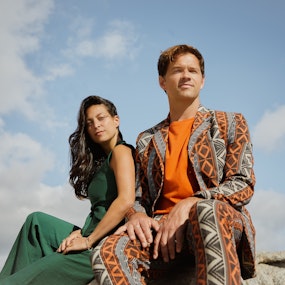
St. Lucia
Artist
Utopia could be a physical location. It could be a certain era. It could simply be a state of mind. The definition varies for each of us, but its core concept of bliss, safety, and perfection persists. Perhaps now more than ever, we seek such nirvana. Often, we need to create this feeling ourselves.
That’s what St. Lucia has done with their first new music in 4 years.
Led by husband-and-wife duo South Africa-born Jean-Philip Grobler and Germany-born Patti Beranek, the group retreat from a fractured world on fire and into the glow of a rapturous synth-spiked electro-pop catharsis—like a dance party at the edge of existence. On the aptly titled Utopia I EP, St. Lucia beams out a light of their own and shines brighter than ever.
“In a way, this is my personal rebellion against the darkness of the world,” states Jean-Philip. “From the beginning, the name St. Lucia came from me making escapist music. In South Africa, there’s a place called St. Lucia, and it’s similar to the island in the Caribbean because it’s where you escape. It’s utopia. There are many ideas of utopia, whether it means virus-free or a virtual tech utopia. It’s easy to feel depressed these days, so I’m trying to bring something joyous to the world. I was sick of seeing shit on the Internet, and I just wanted to feel good. That’s what being human is about. We have to feel alive, no matter what is happening around us.”
St. Lucia has always stirred these kinds of feelings. It started with When The Night, which boasted fan favorites such as “Elevate,” “All Eyes On You,” and “Closer Than This.” The…
Read More
Featured Episodes
Here are some great episodes to start with. Or, check out episodes by genre.























